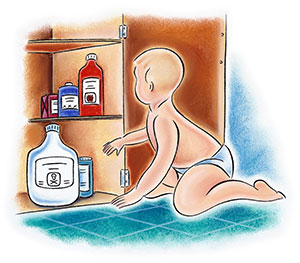 What do bath salts, houseplants, energy drinks, mouthwash and over-the-counter medicines have in common? All of these items can be poisonous when used inappropriately and it only takes a second for a child or beloved pet to ingest a household chemical or medicine that could cause permanent damage.
What do bath salts, houseplants, energy drinks, mouthwash and over-the-counter medicines have in common? All of these items can be poisonous when used inappropriately and it only takes a second for a child or beloved pet to ingest a household chemical or medicine that could cause permanent damage.
Every March, the American Association of Poison Control Centers and other healthcare organizations promote National Poison Prevention week, March 16-22, to raise awareness about the risk of poisoning from a wide variety of common substances, including many that may not seem dangerous to the average consumer.
Who is at risk?
Although accidental poisoning of infants and children account for approximately half of poison emergency calls, the majority of poison death victims are adults. Prescription medicines, pesticides and carbon monoxide are just a few of the potential poisons that may put adults at risk. In particular, older adults are at higher risk of adverse outcomes from poison exposure.
What substances are considered poisonous?
According to the AAPCC, painkillers, cosmetics and household cleaners top the list of substances most frequently implicated in calls to poison control centers. But any substance can become harmful if used inappropriately. No matter the substance, read labels and follow directions carefully, and be sure any potentially hazardous substances are securely stored when not in use.
Minimizing your risk
Most poison exposures are accidental, so it's important to develop safe habits and take precautions to prevent unintended exposure. Check the AAPCC website for current alerts and information, and follow their guide to making your home or office safe, from bathroom to garage.
Keeping prescriptions safe
Prescription medications including painkillers, sedatives and heart medicines pose the greatest risk of causing serious effects from poison exposure. Always keep prescription medicines in their original, labeled containers, or in a secure medicine dispenser. Medicines should be out-of-reach of children and guests, and locked up if necessary. Always take prescription medications as prescribed and never share them with anyone else. If you are older or just forgetful, use a daily dispenser to prevent double dosing.
Pets and poison
Because they spend plenty of time close to the ground, our furry friends can be at increased risk of ingesting something that may cause an adverse reaction. And unlike humans, pets are unable to speak up and tell us they need help.
In addition, many items that are not usually poisonous to humans may be poisonous to your pet. Foods you should never give your pet include grapes, chocolate, drugs or alcohol, macadamia nuts, onions, garlic and caffeine. Certain plants and flowers, such as lilies and tulips, may also be poisonous to cats and dogs. If you suspect your animal may have swallowed something harmful, contact national Animal Poison Control at 888-426-4435.
If you are exposed
If you or a loved one is concerned about poison exposure, call your local poison control center by dialing 800-222-1222. If possible, know the amount ingested and have the package or container on hand. The service is free, private, and confidential, and is available 24 hours, seven days a week.
For any insurance questions, call or contact Litaker Insurance today.
